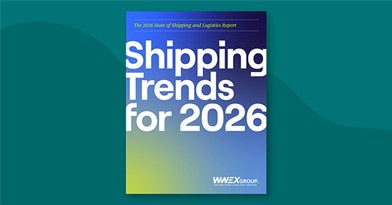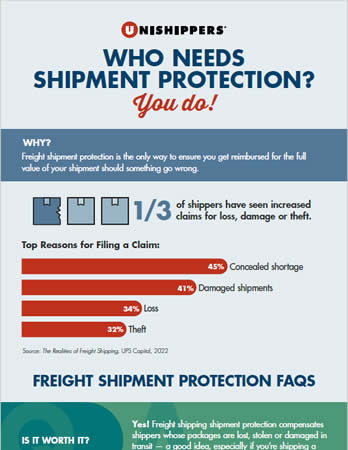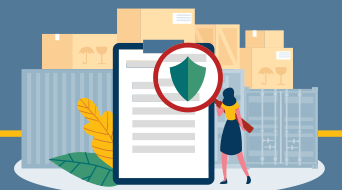Freight Shipping: Understanding Carrier Limits of Liability (And Why To Purchase Insurance)
If you are a frequent shipper, you probably already know that it's not a matter of if, but when an accident will impact your freight shipping. There are a number of factors that could lead to lost or damaged freight shipments, such as inclement weather or movement in transit — but what factors fall under the carrier's limits of liability?
Whether the accident was within the carrier's control or not, you could risk losing money if you did not invest in freight shipping insurance. Shippers often make the mistake of assuming that their freight shipping is automatically insured under the motor carrier's liability insurance. The truth is that carrier liability is not the same as insurance and may not cover the full value of your freight shipment.
Let's take a look at what carrier liability covers and how it may or may not protect your freight shipping:
What does carrier liability cover in freight shipping?
Carrier limits of liability determine the maximum amount a carrier can be held liable for in the event of damage, loss or delays to your freight shipping. However, limits of liability vary based on the carrier, the condition and size of the item(s) being shipped, the packaging and the commodity class of the freight — regardless of the actual value of the shipment.
Carrier liability typically only covers damage or loss that occurred due to the carrier's negligence. In many cases, in order to settle a claim, the shipper must prove that the damage was the carrier's fault. Perhaps the biggest limit to carrier liability is that there is no official deadline to settle a claim, allowing the process to drag on for months. To learn more about successfully filing a freight claim, download Unishippers' Roadmap to Freight Claim Success.
What is not covered under carrier liability?
More important than what is covered by carrier limits of liability is what carrier liability does not cover. Under carrier limits of liability, carriers can't be held responsible for damage or loss that occurs due to:
- An act of God, such as inclement weather or natural disaster
- Interference by a public enemy of the U.S. or an act of war
- Improper packaging of cargo by the shipper
- Government action, such as a road closures, quarantines or trade embargoes
- The nature of the goods, such as produce, tobacco or medical supplies which are prone to spoil or become defective over time
There are also limits to the amount covered by carrier liability. Depending on the carrier, limits can range from $.15 to $25 per pound — which means there is often a gap between the reimbursement amount and the actual value of the shipment. So even if you feel confident that the carrier will take responsibility for the mishap, it's still possible that you won't receive the full value of your freight shipment under the carrier's limits of liability.
Why You Need Freight Insurance
The bottom line is this: If a carrier can prove that the damage to your shipment occurred due to one of the exceptions listed above, or if the value of your cargo exceeds the carrier's reimbursement limits, you may simply be out of luck in recovering the full value of your shipment. The only way to ensure you are reimbursed for the full value of your shipment is to purchase freight shipping insurance, also called cargo insurance.
Is freight shipping insurance worth it?
There is no guarantee that your shipment will reach its destination in one piece or even arrive at all. Motor carrier liability insurance compensates shippers whose shipments are lost, stolen, or damaged in transit. Shipping insurance is a good idea if the value of what you are shipping is a high-value item. If you want to be extra cautious or if the item is of very high value, you may want to consider a white glove delivery service.
How much does it cost to ship with freight carrier insurance?
The cost of insurance varies by carrier and the value of the items shipped. If the contents of your package are worth $100 or less, you are likely already covered.
How much freight insurance should I get?
Get freight insurance in the amount it would cost to replace the items you are shipping. You are unlikely to get more compensation than its retail value if it is lost or damaged in shipping.
What is the maximum liability for LTL and full truckload?
For full truckload shipments, make sure to inquire about the maximum carrier liability for damaged freight. Additional liability coverage can typically be purchased. Liability for LTL shipments varies by carrier, packaging, and freight class. Be sure to check out what your shipment’s terms are as well, FOB terms define who is liable for the shipping cost and who will need to address any product damage during the shipping process.
How do I get freight insurance to protect against lost or damaged freight?
Unishippers offers ProfitProtect™, robust freight shipping insurance administered by UPS Capital Insurance Agency, Inc., to protect their shipments. Our freight insurance offers full and flexible coverage that applies to any carrier or mode of transport. Plus, we make it easy to add insurance right at the time you book your shipment with our easy-to-use transportation management system.
Your Unishippers shipping experts can help ensure your freight shipping gets from point A to point B with the proper coverage and the peace of mind that comes from knowing your investment is fully protected and with a dependable freight carrier.



